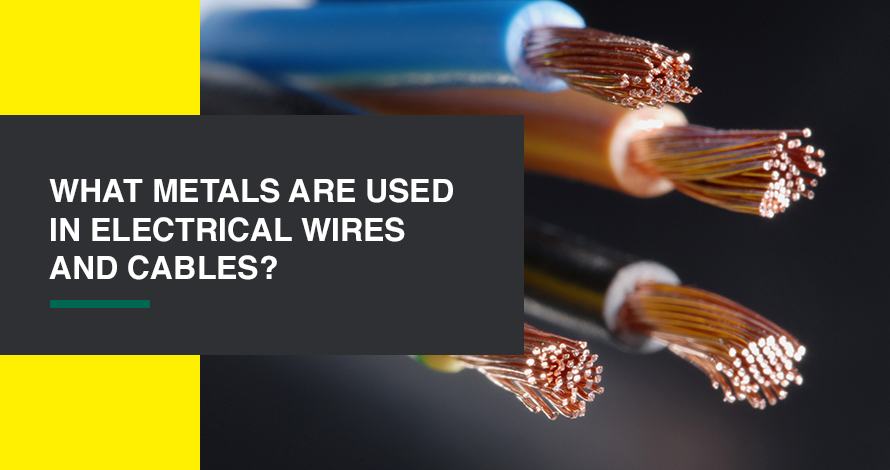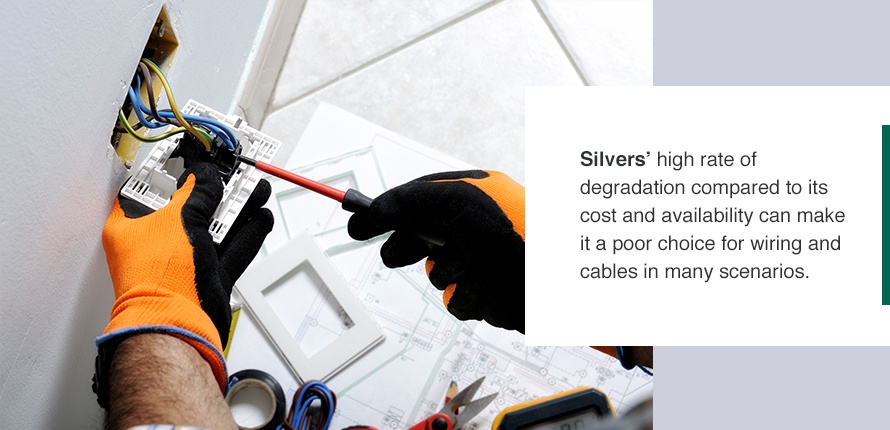
Whether you’re working on a home remodeling project or trying to figure out the wiring for your new home addition, you may want to learn more about the different types of cables and wires you may come into contact with.
A wire is a medium used to conduct electricity from one point to another. A cable is one or more wires running side by side, which is used to conduct electricity from one point to another. And if you’re wondering what types of metals are used in electrical wires and cables, we’ve got you covered.
In this article, we will explore several types of metals that are commonly used in electrical wires and cables. Just keep reading to learn more.
Copper
Copper is the most commonly used metal in wires and cables. Whether it’s a kettle power cable, a stove wire, or a laptop charger, it’s probably made of copper. Featuring the atomic number of 29, this red-brown metal has become the most relied-on metal for cables and other wiring.
Copper is a highly conductive metal. That means electricity can easily pass through copper, which makes it ideal for electrical wires. Copper is also relatively inexpensive compared to other metals. Compared to gold, which has a higher conductivity rate and is more expensive, copper is the most economical metal to use for electrical wiring. This means that essentially copper is the best conductor of electricity while still being economical and affordable to use.
While copper is great for conducting electricity at a reasonable price, it’s also ductile. A ductile metal can bend, flex and fold to a certain degree without causing any damage to the wires, cables and insulation. Copper is also formable, making molding and building cables and wires very easy to do as it takes form.
Another great benefit of using copper for electrical cables is that copper is also thermal-resistant. Thermal-resistant wires and cables can withstand a large amount of heat without becoming damaged or causing an electrical fire. Electrical copper wires and cables are much safer to use for this reason, compared to other metals. Copper is also recyclable, making it a great green choice for your home.
Copper has become the universal standard in wires and cabling because of its conductivity, affordability, ductility and thermal resistance.
Gold
Gold is also another commonly used metal in wires and cables. It’s usually coated around other metal strands because it’s an inexpensive metal to use as the sole conductor. Gold is highly conductive and offers a superior level of electrical conductivity compared to copper, silver, and aluminum. Copper and other metal wires are often lightly coated with gold on connection points for several reasons. The most common is extremely thin wires, which can sometimes lower the conductivity and capacity.
Gold is exceptionally solderable and doesn’t produce any surface oxides. Gold does not chemically react under normal conditions, which makes it a noble metal. Noble metals show outstanding resistance to chemical attacks even at high temperatures. Gold also has excellent corrosion resistance. It’s alloyed with small amounts of nickel or cobalt and has good wear resistance.
Gold coating on wires and cables offers durability and flexibility, making this metal a key choice in electrical wires and cables. Gold is also used in home electronic wiring because of its longevity and efficiency. The only downside to using gold is that it is expensive, and you can likely achieve the same results by using a copper wire or cable.
Silver

Silver is one of the most conductive metals known to man. Although this metal oxidizes, silver is still a great electric conductor of electricity, and that is why you can use it in cables and wires.
Silver offers excellent durability and easily flexes and bends to allow for the daily use of electrical cables. However, silver is a rarer metal to come across, making it an expensive choice for cabling and wiring. The second shortfall of silver is that it reacts to oxidation much easier than copper and aluminum, which means that copper and aluminum can withstand a much longer time against environmental effects. All wires degrade over time, however, silvers’ high rate of degradation compared to its cost and availability can make it a poor choice for wiring and cables in many scenarios.
Aluminum
Like copper, aluminum is a commonly used metal for wires and cables due to its availability and cost. Aluminum is a great conductor of electricity and has been safely used for more than 100 years in cables and wires.
Aluminum is durable and ductile, which means that it can easily be bent and flexed, allowing you to move and mold it as needed. Aluminum wiring is also lightweight, which means that it is often used for high voltage lines because it’s lighter weight reduces the tensile force placed on the wire, enabling the aluminum wire or cable to last longer. Aluminum is also corrosion-resistant. In other words, the lifestyle of an aluminum cable is much higher than that of silver or gold. Aluminum also offers two times the conduct per pound of copper wiring. Aluminum is also thermal-resistant, which makes it a good choice for wires and cables that will be running a current for long periods. These are some of the reasons aluminium is used in power lines.
Aluminum and Copper have been used for 100’s of years as conductors for several reasons. They are both safe for industrial and residential buildings, approved by the National Electric Code, trusted by the utility industry, and efficient electrical applications.
Tungsten
Tungsten, also known as wolfram, is a less common metal. It’s an exceptionally refractory metal, meaning that it’s exceptionally strong and durable against heat and wear. This metal is often used in steel to increase hardness and strength. Tungsten has also been used in metal wiring because it has the highest melting point of all metals.
Tungsten has been used for centuries in wiring as filaments for lighting, electron tubes and electrodes. Tungsten can be expensive, so it’s often only used where no other metal could withstand high temperatures.
Learn More About Electrical Wiring From the Wiretech Company
If you need help with your electrical wiring or want to learn more about the different types of cables and wires, Wiretech Company can help! We’ve got you covered for all of your wire and cable needs. Our experts are fully licenses and insured and have years of experience working with electronics and wiring. Whether you need help with your remodeling project, new home addition or other wiring projects, you can rest easy knowing our experts will get the job done right.
Contact us today to get started with your next wiring project!

